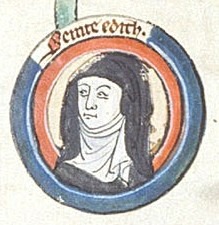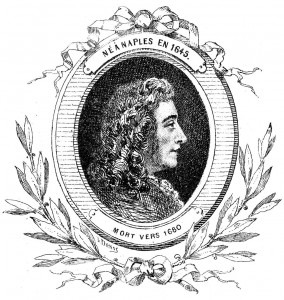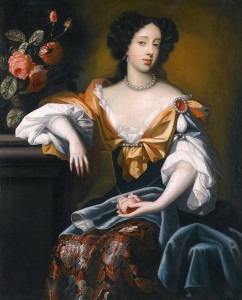
Edith of Wilton
She appears in music in the wonderfully titled Santa Editta, Vergine e Monaca, Regina d’Inghilterra (Saint Edith, Virgin and Nun, Queen of England), an oratorio by Alessandro Stradella (1639-1682). The work was composed in Rome in the 1670s to a libretto by Lelio Orsini (c. 1623-1696). Orsini, Prince of Vicovaro, also wrote librettos for at least 15 other oratorios that were set to music by composers in Rome.

Alessandro Stradella
Why would have Stradella chosen such an obscure saint to set as an oratorio subject? When you look at the larger picture of a young religious woman who is asked to set aside her vocation and you look at 17th century Italian politics, there is a parallel. Maria Beatrice d’Este, who was the sister of Francesco II, Duke of Mantua, was determined on a life in the convent. Louis XIV, on the other hand, wanted to put a Catholic couple on the English throne and wanted her to marry James Stuart, the Prince of York. It took the intervention of Pope Clement X to get the princess to abandon her vocation and accept James for the good of the Catholic faith. She married James, he took the English throne as James II in 1685, only to lose it in 1688 to William and Mary.

Mary of Modena by Simon Pietersz Vereist (1680)
Stradella: Santa Editta, vergine e monaca, regina d’Inghilterra: Part I: Aria: Speranze gradite (Verónica Cangemi, St. Editta; Ensemble Mare Nostrum; Andrea De Carlo, cond.)
Beauty, in a dramatic recitative and aria, tells Edith that she shouldn’t scorn the gift of beauty given to her by nature because it would be an asset to her in power.
Stradella: Santa Editta, vergine e monaca, regina d’Inghilterra: Part I: Recitative: Di chi brama il tuo ben – Aria: Chi pianti e sospiri (Fernando Guimãraes, Bellezza; Ensemble Mare Nostrum; Andrea De Carlo, cond.)
Edith argues back with Bellezze, rapine dell’ore fugaci (Beauty, depredation of fleeting hours):
Stradella: Santa Editta, vergine e monaca, regina d’Inghilterra: Part I: Aria: Bellezze, rapine (Verónica Cangemi, St. Editta; Ensemble Mare Nostrum; Andrea De Carlo, cond.)
At the end of Part I, Humility and Grandeur debate and argue about who can bring back peace: Humility says that Grandeur’s pomp and honours are mendacious while Grandeur complains about Humility’s wretched attire. They close by asking “What makes the soul happy?” and they each answer “Grandezza” and “Umilità”, but we notice that Humility has the last word.
Stradella: Santa Editta, vergine e monaca, regina d’Inghilterra: Part I: Duet: Chi può le nostr’alme (Claudio Di Carlo, Umiltà; Gabiella Martellacci, Grandezza; Ensemble Mare Nostrum; Andrea De Carlo, cond.)
In her last aria, Edith closes with “…when kindly Heaven calls, may we hasten to the encounter” in a lovely aria. She’s no longer the frivolous character we heard at the beginning, but after having to make her argument, has more gravity in her response.
Stradella: Santa Editta, vergine e monaca, regina d’Inghilterra: Part II: L’orme stampi veloci il pi (Verónica Cangemi, St. Editta; Ensemble Mare Nostrum; Andrea De Carlo, cond.)
Grandeur returns to tell of Edith’s return to the nunnery and predicts her later rise to heaven and Nobility, Grandeur, and Beauty close with a trio and the a final word from Humility.
Stradella: Santa Editta, vergine e monaca, regina d’Inghilterra: Part II: Terzetto: A notte breve (Francesco Aspromonte, Nobilità; Gabiella Martellacci, Grandezza; Fernando Guimãraes, Bellezza; Ensemble Mare Nostrum; Andrea De Carlo, cond.)
Stradella: Santa Editta, vergine e monaca, regina d’Inghilterra: Part II: Recitative: Di profeta real s’odan gli accenti (Claudio Di Carlo, Umiltà; Ensemble Mare Nostrum; Andrea De Carlo, cond.)


